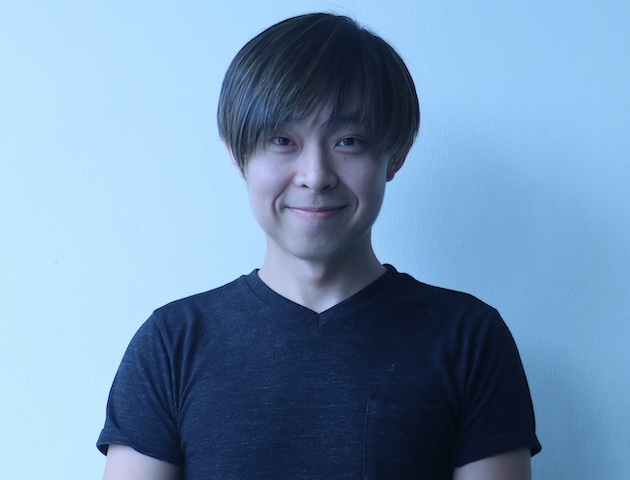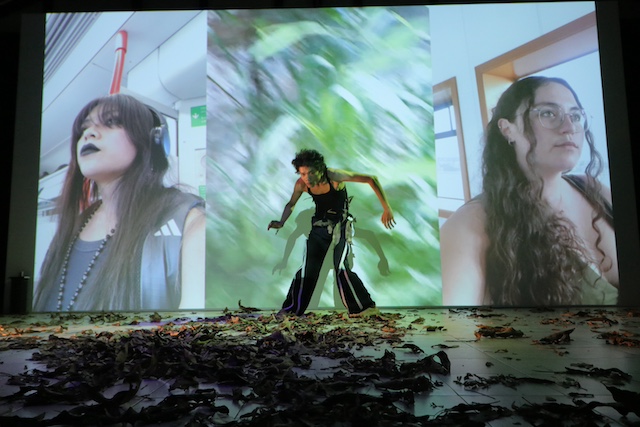Kelvin Wong, a theatremaker and PhD student in Drama at Exeter and Bristol, tells us about his ‘translocal’ globe-spanning project
Hi Kelvin. Your research project has many global connections! Where are you as we interview you?
I’m back in Kuala Lumpur, Malaysia right now for a quick break. I just spent a month in Chiang Mai, Thailand, working on the first iteration of Unsilent Mode: Vol. II, which premiered last weekend. In a few days, I’m off to Singapore for a theatre education conference, then back to Kuala Lumpur for another week before heading to Setúbal, Portugal at the end of July – that’s when the second iteration kicks off. It’s nice to be home for a bit – getting stuck in traffic, eating food I’ve missed, and catching up on what my local theatre colleagues have been up to.
Your work investigates ‘translocal dramaturgy and sustainable devising practices with and for a digital generation.’ Can you translate that for our readers who are not familiar with theatre?
Sure! Unsilent Mode involves emerging theatremakers from across the globe, but no one – except me – physically travels. Each performance features a physical performer in the space, joined by digital collaborators who appear live or through pre-recorded media. We use different forms of live and mediated performance to bring these remote collaborators into the same tangible environment.
During the creation process, these forms intersect, collide, and sometimes combust – and that’s how the work gets made. When the project moves to a new location, the collaborators rotate between physical and digital roles. So, in that sense, international collaboration becomes possible – without the usual hassle of immigration, documentation, accommodation, transportation, or carbon footprint.
Because the performances shift from place to place, it’s never a simple copy-paste from the last version. Even though we’re telling the same core story, we have to respond to new bodies, new spaces, constantly shifting social and political contexts, and topical media. More importantly, this shift also includes the audiences – their shared and personal histories, collective and individual knowledge, language, and expectations.
For example, during the making of Unsilent Mode: Vol. II in Chiang Mai, we performed in a venue that’s often used by social activists. That influenced how we saw and shaped the work – it naturally took on a more subversive slant. We didn’t have to be too on-the-nose when exploring borders, migration, and the idea of home in flux – the space and the audience already carried that resonance. Nestled in lush rainforest surroundings, we wove dried leaves and stones into the visual storytelling and spatial design.
When the work moves to Portugal next, it will continue to adapt – translocally – to a new time, space, context, and audience.
What does your audience see when they come to see a performance of ‘Unsilent Mode’?
In the first volume, which was presented in Yokohama, Kuala Lumpur, and Exeter last year, audiences experienced three narratives unfolding simultaneously within a modular structure set in a dynamic media environment – think of it as an immersive, theatrical version of scrolling through a social media newsfeed, with live performers both physical and digital from across the globe. The audience was sometimes implicated in the experience – they appeared on screen, and the fourth wall was often challenged. In Kuala Lumpur, for example, an audience member even got a foot bath midway through the performance.
In Vol. II, the same dynamic environment took place, but the audience had more collective agency. They were invited to participate – using sticky notes that were captured on a Zoom screen; sending personal confessions via their phones from their seats; and in the finale, voting on a solution to an imaginary (but highly probable) local crisis. I found it fascinating that in Thailand, we had three different outcomes across three performances. In this sense, the audience became co-authors of the theatrical experience – not just passive viewers.
The goal of Unsilent Mode is to reconstruct the theatre experience for a digital generation of audiences – and I imagine the final project involving even greater authorship on their part. Think of it like a game with stakes, unfolding both physically and digitally, but played by a live community sharing the same space – performer, audience – or perhaps, no distinction at all.
Where we do our PhDs is shaped by supervisors, funding, and many other practicalities. How has it worked for you as an international theatre-maker to land in Exeter?
I grew up in Kuala Lumpur, with my formative theatre years rooted in that soulful, chaotic city. I then spent four years in dynamic Chicago pursuing my MFA. Moving to Exeter for my PhD took a little getting used to – the scale is smaller, the pace is slower, and making food that reminds me of home has been a challenge.
But when I reflect on the quality of support and supervision I’ve received from my three supervisors – alongside the wealth of resources and research available at my fingertips – my concerns about living in a small town are close to none. Exeter has grown on me. I wouldn’t have been able to write and reflect on my work as critically anywhere else – anywhere bigger would have been too distracting.
The funding I’ve received from the AHRC SWWDTP has allowed me to travel across the world, network and collaborate with diverse performance-makers, and bring the kind of theatre I imagine to vastly different communities. It’s become a springboard for the international collaborations I see myself continuing long after my doctoral studies. And I’ll remember Exeter – both the University and the town – as the place where it started.
And when I miss my family, friends, and community of theatremakers back in Kuala Lumpur, there’s always Zoom – and a small network in London, just three hours away.
Practice-based PhDs can feel very different to those based in labs or archives. Have you found good ways to be part of the wider PGR community?
The Communications, Drama, and Film Department has been organizing events that bring together PGRs, which I’ve found really helpful – especially since practice-based PhDs can sometimes feel like you’re in your own little bubble. These gatherings have created spaces to exchange ideas, share frustrations, and celebrate small wins across different disciplines.
Because my output is in the form of live performances, many colleagues have attended my projects – which I’ve really appreciated. I’ve also connected with practice-based PGRs who’ve graduated from Exeter, as well as others from different universities. Their support and wisdom have made a big difference in how I approach my work. Now, I make it a point to reach out to newer practice-based PGRs too – to offer the same kind of support that I’ve received.
Theatre practice was profoundly impacted by the Covid-19 pandemic, and it holds deep challenges for environmental care. How do you see research projects like yours playing a part in the future of the industry?
Living in a hypermediated world, technology, digital connectivity, and AI are like the air we breathe – and the pandemic has reinforced how much we rely on them to maintain some semblance of normalcy. It’s subtly changed the way we take in, process, and respond to information.
I see my research as a small droplet in an exponentially expanding sea of adaptive methodologies – but more importantly, I hope it plays a role in reversing the crisis of empathy. We’re dealing with a lot of uncertainty, and the notion of home has become a lot more fragile. The challenge now is to create work that doesn’t just reflect this fragility but invites people to sit with it, and respond to it together.
As for environmental care, I see the project as a small suggestion for more sustainable theatremaking practices. I’m aware that digital connectivity still consumes vast amounts of energy – but compared to constant international travel, its footprint is significantly smaller. It’s not a perfect solution, but it opens up ways to rethink how we collaborate globally while being mindful of impact.
If you could go back to the start of your project and change one thing, what would it be?
To embrace the subversive spirit in the making of my work – earlier. In the beginning, I was holding on to certain structures and conventions, trying to make the work legible in specific ways. But Unsilent Mode really comes alive when it disrupts, challenges, and unsettles.
Finally – can you recommend a theatre piece (in-person or digitally mediated) for other PGRs to enjoy over the summer?
I’d recommend Deaf Republic at the Royal Court Theatre in London (August 29 – September 13) – a powerful, politically charged performance that fuses poetry, British Sign Language, live cinema, and puppetry to explore silence as a form of resistance.
If you’re in Setúbal, Portugal, Unsilent Mode: Vol. II goes up on August 22 as part of the Setúbal International Theatre Festival. And if you’re in Bristol, the third iteration plays from September 18–19 at the University of Bristol’s Wickham Theatre. For more info, visit unsilentmode.com.

Kelvin Wong is a Malaysian theatremaker, producer, and educator. He was a Resident Director at The Kuala Lumpur Performing Arts Centre and the Artistic Director of Theatresauce, a director-focused collective he founded in Kuala Lumpur. He holds an MFA from The Theatre School at DePaul University, Chicago, and has taught at Sunway University, Malaysia. Kelvin is currently a second-year PhD candidate at the Universities of Exeter and Bristol. His practice-based research is funded by the UKRI Arts and Humanities Research Council (AHRC) South, West and Wales Doctoral Training Partnership (SWWDTP). k.wong2@exeter.ac.uk

